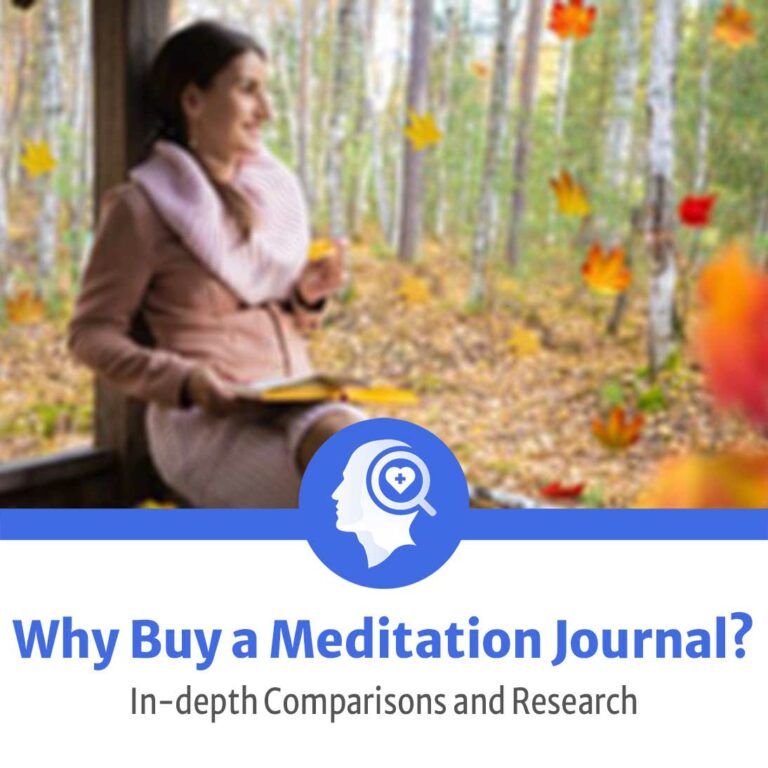Why Purchase A Meditation Journal?
- 2023-06-11
-
Luz Chacon
- 06/11/2023
The fact is that buying a meditation journal simply makes your daily meditation easier and more effective. You can follow guided prompts for beginners or become creative and draft your practices the way you want. This depends on whether you purchased a guided meditation journal or a blank meditation journal. At Find It Health, we see meditation journals as great tools toward true mindfulness, hence our research team did the proper work to tell you why you need one for your next practice.
Many meditation journal users select a journal based on their type of meditation and level in the practice. Choosing the right meditation journal depends on the time you wish to devote, your overall expectations from the practice, etc. Moreover, many journal marketing are overwhelming and downright false.

Table of Contents
What is a Daily Mindfulness Journal?

A daily mindfulness journal is any personal space that you create to keep track of your daily mindfulness practices. This space is where you record, reflect and measure your progress each day.
It can be a physical space like when you make use of a notebook or pre-written checklist texts. Or, a digital space as you can find in a meditation app, keeping a digital record, using online checklists, etc. An advantage of digital journaling is regular notifications to maintain consistency.
Keeping a daily mindfulness journal will add meaning to your meditation experiences and make you more intentional. Where it enables you to reflect on your past practices, this will inspire you to go deeper into your self-care and reflection.
A daily mindfulness journal is just another name for a “daily meditation journal”. So, do not confuse as the terms are used interchangeably.
For better concentration and alertness during your meditation session, you can try out an energy gum. Here is an article on the caffeine gum you can choose from.
Meditation Journal Example and Types

Examples of meditation journals that you can keep include a brief note journal, extended journal, and double-entry journal. The best option for your practices depends on your daily routine and devotion.
On the other hand, there are various types of meditation journals that you can buy to help you with your daily practices. For example, you can choose between a common guided journal or a blank journal (notebook).
Examples of Meditation Journal Entry
Brief Note Meditation Journal Entry
You can keep a brief-note meditation journal by only writing out very concise lines about your meditation session. It’s easy to start by writing about the type of meditation, time spent, your challenges, source of inspiration, and general feeling.
Remember to jot down your exact feelings because your journal is a tool and not just an article. Take for instance,
“Breathing meditation. 10 minutes. Lost concentration most of the time. Experienced calmness unlike before. Felt I could do better next time.”
This is very brief but powerful. It can help you remember what your previous practice was like and compare it with future ones.
The brief note journal is suitable when you don’t have enough time on your side to write elaborately. Or, when you can’t seem to think out what to write. It is better to start writing with the intent of creating a short record, then end up writing more. Instead of trying to write so much and encountering a feeling of failure.
- Extended Meditation Journal Entry
After your daily meditation practices, you can decide to give a full account of your feelings and experiences. This can take from a paragraph to a page or more.
If you are prolific at writing or good at narrating events, keeping an extended journal would be less of a hassle for you. Also, the amount of time you have on your side is a determinant.
When going for a meditation class or retreat or you have a coach, extended journaling will make more sense. This is because it is easier for someone else to read and understand your struggle. They can quickly make comments that can help you in the future.
Even if it is personal, you can quickly recall your feelings by glancing through a page of your extended journal. As a result, you can appreciate your progress and improve your self-affirmation.
Double-entry Meditation Journal Entry
With a double-entry journal, you write your daily meditation experiences on one page while leaving the other page blank. The blank page is usually the left-hand side of your journal.
Essentially, you are leaving a blank page so that you can make future comments on it. This is usually on your weekly reviews when you go through your journal for a progress report.
What you write on the blank page can be your points of reflection, things you learned, a summary of practice, etc. These will serve as your major trends for monthly – yearly review.
Types of Meditation Journal
Guided Meditation Journal
This is an already organized journal with prompts, step-by-step meditation guides, and questions. While you may feel restricted to the guidance of this type of meditation journal, it is a great start for beginners.
You can buy a guided meditation journal at any standard stationery store around you or via online marketplaces.
Blank Meditation Journal
This type of meditation journal does not contain pre-written texts. It can be completely blank offering you the freedom to be creative and format in your own way. Or, it can come with ruled pages that you can write on.
There are standard bestseller blank meditation journals that you can buy and use. Or, you can simply purchase a notebook if you don’t have one already and use it as a blank meditation journal.
A blank meditation journal is most suitable for those experienced in a mindfulness exercise. This will help them maintain a daily journal to explore their spirituality better.
What are Mindfulness Prompts?

Mindfulness prompts are the questions that you ask yourself and then provide the answers in a journal. These questions help you stay in the moment, figure out who you are, and what you’re most likely to think about.
Without mindfulness journal prompts, your writing will barely have direction. So, to keep an effective mindfulness journal, you need to write alongside mindfulness writing prompts.
Some mindfulness prompts for your self-care journal entry includes:
- If I could choose where to be right now, where would it be?
- What can I do perfectly no matter the odds?
- When last was I really upset and why?
- Do I influence others or do others influence me?
- Am I happy with my current job and what is missing?
There are several prompts that you can respond to while keeping a mindfulness journal. Providing honest responses to these prompts will give you more control over your life.
In case you ever experience pains of the sciatic nerve, this Find It Health article on TENS Unit shows you exactly how to relieve such pains.
Frequently Asked Questions: Notebook Research by findithealth.com
1. Should you keep a meditation journal?
Yes! You should keep a meditation journal because taking note of your meditation experiences is an integral part of the practice. Among many other benefits, a meditation journal will help you maintain consistency and keep track of your progress. However, this is not a do-or-die affair, hence you can choose when to journal to suit your schedule. It could be daily, weekly, or even whenever you feel like it. Just try to jot things that you can reflect upon in the future.
2. What are the benefits of meditation and journaling?
The known benefits of meditation practice include:
- Reduces the effect of stress.
- Helps to control anxiety.
- Improves self-awareness.
- Promotes mental health.
- Instills peace of mind blocking out noise.
The benefits of meditation journaling include:
- Helps you achieve consistency in practice.
- Gives you the opportunity to assess yourself.
- You can easily identify what works or doesn’t work with journaling.
- Journaling helps you go deeper in practice.
- It serves as a point of reflection when you look back on your practice.
3. Are guided journals helpful?
Yes! Guided meditation journals are helpful in meditation practices, especially for beginners. They give you a head-start and direct your steps when you are just starting out with meditation. You can learn true meditation practices with guided journals. For those experienced in daily meditation, a guided journal can save you time when you can’t create your own routine. You can quickly explore the prompts and follow the routine created by others. This will let you see things from another’s perspective.
4. Is journaling better than meditation?
Journaling is a part of meditation. A reflection journal is where you jot down your feelings and tell yourself the truth you may not tell others. Meditation is looking within to find these feelings and try to gain control over them. You see, trying to compare which is better between journaling and meditation might be a mistake. Instead, see journaling as a practice that makes your meditation experiences better.
5. What are some benefits of journaling?
Journaling has several benefits which include:
- Promotes mindfulness meditation letting you be in the moment.
- Sharpens your memory.
- Boosts mood and general feeling when you keep a gratitude journal.
- Gives clarity on your daily life purpose.
- A wellness journal helps you build a sound immune response.
6. Should I meditate before or after journaling?
Most commonly, the practice is to reflect on your previous journal, meditate, and journal again on the current practice. However, there is no static process to achieve your goals. So, do not feel restricted to popular opinions. Try out your session following different methods till you figure out what works best for you.
Conclusion

Why buy a meditation journal? When you know what a meditation journal is, its functions, and its benefits, you can quickly provide the answer to the question. This page by Find It Health detailed meditation journal, the functions, and benefits. In fact, we did more by providing a direct answer to why you need a meditation journal.
FindItHealth.com is all about your overall health and wellbeing. Check our page for your best pill cutter to help for easy splitting of your small pills.

Luz Chacon
Luz Chacon is a Health Educator, Wellness Coach, and EFT Tapping Practitioner with 30+ years in health advocacy. Specializing in stress management, wellbeing, and holistic health, she created a 40% stress reduction employee program. Luz is dedicated to helping busy individuals prioritize self-care, break patterns, and reach goals. She offers programs for organizations and individuals. Luz is passionate about sharing her health research and guiding informed choices!

